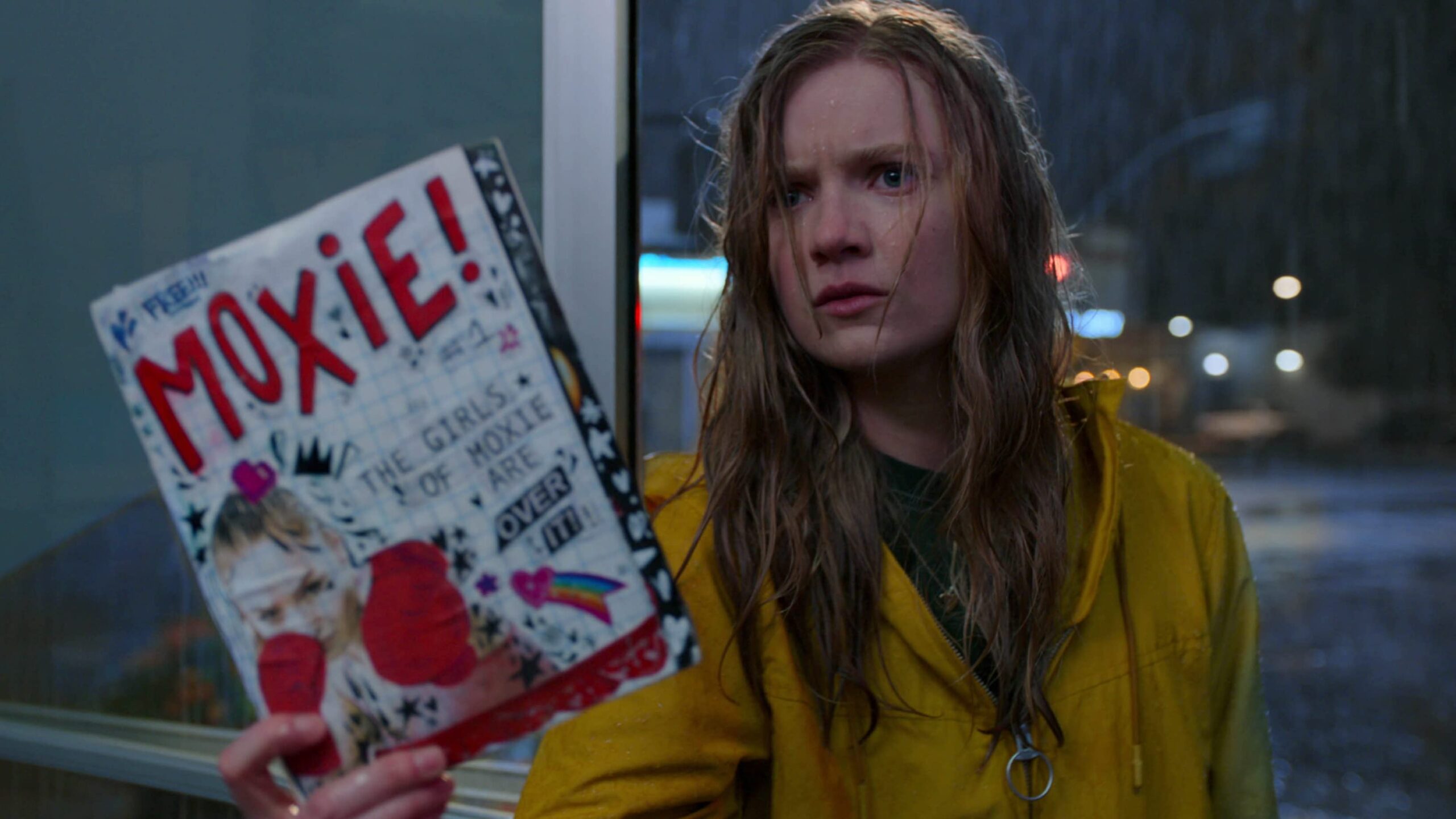On March 3rd 2021, Amy Poehler’s comedy-drama Moxie was released on Netflix. The movie follows Vivian, a shy teenager who is fed up of the sexist and toxic status quo followed by her school, and gets inspiration from her mother’s rebellious past to anonymously publish a zine that sparks a school-wide, coming-of-rage revolution. A tale that integrates coming-of-age with social commentary, Moxie manages to start the conversation on society’s perception of women, particularly teenage girls. It also forces us to take a second glance at the gender bias and patriarchal norms embedded within social institutions, as well as the injustice that stems from it. While Moxie centralizes on gender disparities and dismantling the double standards set between men and women, it also sheds light on the experience of growing up female.
Themes and messages
One of the most prominent themes discussed within the movie is the sexualization of girls, especially during their teenage years. The film commences with the school year resuming and female students being ranked online based on their physical appearances. Everyone seems to accept their rankings, despite their discomfort, and when Lucy (Alycia Pascual-Peña) reports the ranking to the principal, she is dismissed easily. Another girl, Kaitlyn (Sabrina Haskett) is later reprimanded for wearing a tank top to school and forced out of class for not covering up, even though other students were dressed similarly. The principal criticizes her for ‘distracting’ others in class with her body- a common form of sexualizing young girls at an early age and blaming them for their body’s natural development, instead of the people who are perceiving her as a sexual object. Dress coding primarily targets female students and suggests that a girl’s outfit matters more than her education.
“Ooh. There’s that word [harassment]. If you use that word, that means I have to do a bunch of stuff. But if he’s bothering you, and that’s what it sounds like to me, then we can actually have a conversation. Lucy, I am aware that outside these walls the world is experiencing a tornado. And that, in response, young people, especially girls, are expressing their discontent about everything in every direction. But we have to be clear about things before we move forward.”
– Principal Shelley, when Lucy reports being harassed.
Safe spaces cannot perpetuate patriarchal norms
While the school presents itself as a safe space, the patriarchal norms within are subtle and insidious. The rhetoric of ‘boys will be boys’ is emphasized across several scenes when male students blatantly harass female students without any repercussions. Girls are subjected to male students invading their personal space, touching their bodies without consent and in one instance, Mitchell (Patrick Schwarzenegger) corners Lucy at a vending machine and spits in her drink when she rejects his advances. Almost everyone at school regards this behaviour as normal, innocous even, reinforcing the assumption that boys are wired to be a certain way, and therefore will be that way no matter what. Additionally, when Moxie campaigns for girls to wear tank tops to protest dress coding, male students take it as an opportunity to publicly sexualise the girls instead. While teachers witness these instances, they keep themselves out of it as it is considered a ‘women’s issue’ and turn a blind eye to the harassment- a reflection of society’s tendency to forgive men’s bad behaviour, in spite of the potential danger it exposes women to.
Double standards are also shown as being prominently institutionalised within Moxie, as men in sports are glorified over women, despite girls faring better. Girls, especially ones of colour, are sidelined and treated as being a lesser standard compared to their male counterparts, their achievements and contributions shelved to prioritise boys’ instead. They are constantly talked over, mansplained to and gaslighted during conversations, and when they attempt to argue back, they are told to ‘calm down’ and deemed as being ‘hysterical’. The movie also highlights the societal expectation that women are expected to remain passive and change their behaviour to accommodate men and their aggression.
“Why should I have to ignore him? Why can’t he just not be a dick?”
– Lucy, when told to ignore Mitchell’s bullying
Feminism’s intersectionality and racial disparities
In addition to exploring women’s liberation and gender equality, Moxie also manages to address intersectionality and racial disparities within the feminist movement. White privilege is consistently exhibited between Vivian (Hadley Robinson) and her friends, who are women of colour. When Lucy, a biracial student, warns that Mitchell is dangerous, Vivian simply claims that he’s “just annoying”, enforcing the notion that white women don’t understand nor experience the burdens carried by women of colour. Lucy’s reports on the harassment and cyberbullying she experienced was also dismissed by the principal, who is also white. In another scene, Vivian condemns Claudia (Lauren Tsai) for not being actively involved in Moxie; in reality, Claudia cannot afford to take the same risks as Vivian while being Asian-American, and as the daughter of an immigrant, is not privy to the same luxuries allowed to the white and privileged. Additionally, there are also portrayals of society’s ignorance of people of colour, LGBTQ issues, and the working class.
While Moxie is a weak attempt at ‘woke’ feminism, it’s depiction of the female experience presents real issues faced by women everywhere. It also provides significant teaching moments, particularly the value of older generations educating younger generations on gender disparities and working towards dismantling gender and race-based prejudices. The significance of feminist media and strong female role models is highly emphasised, as to inspire hope and power among women and girls. Moxie also focuses on sisterhood and the importance of believing rape survivors, validating their experiences, making them feel safe and protected by holding sexual abusers and rapists accountable.
Why you should watch Moxie
Overall, Moxie teaches a valuable lesson; if you’re doing nothing, you are part of the problem. It escapes the confines of being just another feminist movie; it is a message highlighting the intersections of the feminist movement, the ignorance of white people, the burdens of people of colour, the danger of forgiving abusers and the importance of women supporting women. Though it is not an accurate nor adequate embodiment of attempting a revolution fighting for equality of the sexes, it is an acknowledgement that modern-day feminism is still an evolving concept and an educational stepping stone for those who are struggling to find their voice in the movement. Moxie is not perfect but it is enough for the audience to relate to and recognize the many issues women experience, while also empowering younger generations to do their part in working for gender equality and women’s liberation.
Check out:







Be First to Comment